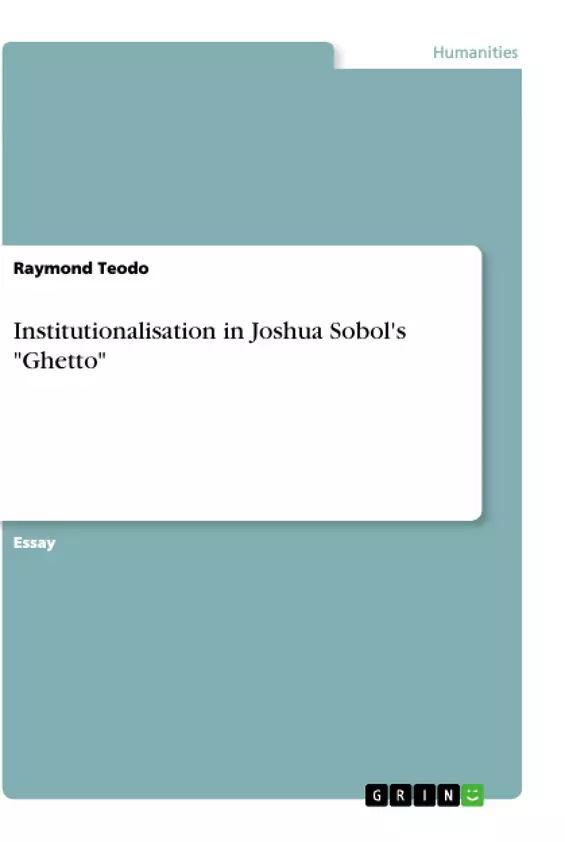This essay discusses two ways in which scholars have interpreted Joshua Sobol's play "Ghetto" (originally published 1989). It outlines the problems that arise from each interpretation of the play, but also discusses how and why scholars came to those interpretations.
The derived conclusion from placing these two interpretations in conversation with each other is that Sobol may have been trying to both give an historical recount of the horrors experienced in the Jewish Ghettos set up by the Nazis, and giving subtle critique on how the Israeli government is treating its Palestinian neighbours. While this essay does not aim to provide definitive conclusions as to what Sobol's motives were behind the writing of "Ghetto", it certainly opens up discussions on how historical contexts can affect the way in which the message of a play or performance is perceived and interpreted.
Inhaltsverzeichnis (Table of Contents)
- Institutionalisation in Joshua Sobol's Ghetto
- The Zionist Movement
- Ghetto as an Allegory for the Current Political Situation in Israel
Zielsetzung und Themenschwerpunkte (Objectives and Key Themes)
This essay aims to demonstrate the validity of Freddie Rokem's argument that Joshua Sobol's play, Ghetto (1989), can be interpreted as an allegory for the current political situation in Israel, despite the historical context of the play being World War II. The essay will do this by comparing the play's portrayal of the Jewish Ghetto Police Force in Vilna with both historical contexts. Through this comparison, the essay will explore the devastating psychological effects of living in strict, regulated institutions like ghettos and concentration camps on future generations.
- The impact of oppressive institutions on individual behavior and decision-making.
- The historical and political context of the Zionist movement and its implications for Israeli attitudes towards Palestinians.
- The allegorical potential of Sobol's Ghetto in relation to the Israeli-Palestinian conflict.
- The psychological effects of institutionalization on individuals and generations.
- The ethical dilemmas faced by individuals within oppressive systems.
Zusammenfassung der Kapitel (Chapter Summaries)
- The essay begins by introducing Freddie Rokem's interpretation of Sobol's Ghetto as an allegory for the current political situation in Israel. This interpretation suggests that Israeli people are in danger of becoming like their earlier persecutors, the Nazis, and that Sobol's play implies that the persecution of Palestinians in Israel mirrors the same plight that their persecutors suffered beforehand.
- The essay then explores the historical context of the Zionist movement, tracing its origins from the mid-1880s to the establishment of the World Zionist Organization in 1897. The essay discusses the Zionist movement's focus on establishing a Jewish state in Palestine and the displacement of Palestinian people that resulted from this effort.
- The essay analyzes the character portrayal of Gens in Ghetto and the real Jacob Gens, the police chief of the Vilna Ghetto. It examines the moral dilemmas faced by the Jewish Ghetto Police Force during World War II and how these dilemmas can be seen as reflecting the current situation in Israel.
Schlüsselwörter (Keywords)
The key themes and concepts explored in this essay include: Joshua Sobol's Ghetto, institutionalization, oppressive systems, the Zionist movement, Israeli-Palestinian conflict, allegory, historical context, ethical dilemmas, psychological effects, and the character of Gens.
Frequently Asked Questions
What is Joshua Sobol's play "Ghetto" about?
The play provides an historical recount of the Jewish Ghetto in Vilna during WWII, focusing on the Jewish Ghetto Police and the ethical dilemmas they faced.
How can the play be interpreted as a political allegory?
Scholar Freddie Rokem argues that the play serves as a subtle critique of the Israeli government's treatment of Palestinians, suggesting that earlier persecution affects current political behaviors.
Who was Jacob Gens in the context of the play?
Jacob Gens was the real-life police chief of the Vilna Ghetto, a controversial figure who faced impossible moral choices under Nazi rule.
What are the psychological effects of institutionalization discussed?
The essay explores how living in strict, oppressive environments like ghettos can have devastating psychological impacts on both individuals and future generations.
What role does the Zionist movement play in the essay's analysis?
The essay traces the history of Zionism to provide context for the current political situation in Israel and its relationship with Palestinian displacement.
What is the main conclusion regarding Sobol's motives?
The essay suggests Sobol may have intended to both recount history and provide contemporary critique, showing how historical contexts affect the perception of performance.
- Citation du texte
- Raymond Teodo (Auteur), 2012, Institutionalisation in Joshua Sobol's "Ghetto", Munich, GRIN Verlag, https://www.grin.com/document/966040



